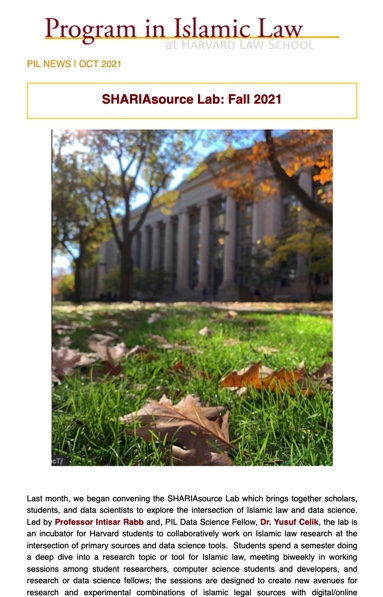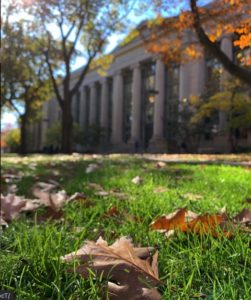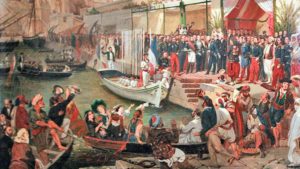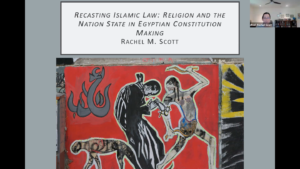
 How is the application of data science tools to Islamic law reshaping the ways we do research?: Last month, we began convening the SHARIAsource Lab which brings together scholars, students, and data scientists to explore the intersection of Islamic law and data science. Led by Professor Intisar Rabb and, PIL Data Science Fellow, Dr. Yusuf Celik, the lab is an incubator for Harvard students to collaboratively work on Islamic law research at the intersection of primary sources and data science tools. Students spend a semester doing a deep dive into a research topic or tool for Islamic law, meeting biweekly in working sessions among student researchers, computer science students and developers, and research or data science fellows; the sessions are designed to create new avenues for research and experimental combinations of islamic legal sources with digital/online tools. Lab members work together to develop and employ for research use a suite of digital Islamic law tools designed to expand access to sources and research. As part of our SHARIAsource, we also launched a ‘CnC Research group’ this term, bringing together a group of leading and emerging scholars from across the world to discuss research questions on Islamic legal history and interpretation using our new beta Courts and Canons (CnC) tools (which focus on early Islamic courts and on Islamic legal canons (qawāʿid fiqhiyya) as tools for interpretation). The CnC group allows researchers to study Islamic legal canons as part of dynamic interpretive questions spanning many centuries and continents. By connecting legal canons to laws (court cases, juristic opinions), people (judges and jurists), and places (regional schools, varied empires and eras), CnC will enable new research insights into the social and interpretive history of Islamic law. Stay tuned for more about these projects in the months to come.
How is the application of data science tools to Islamic law reshaping the ways we do research?: Last month, we began convening the SHARIAsource Lab which brings together scholars, students, and data scientists to explore the intersection of Islamic law and data science. Led by Professor Intisar Rabb and, PIL Data Science Fellow, Dr. Yusuf Celik, the lab is an incubator for Harvard students to collaboratively work on Islamic law research at the intersection of primary sources and data science tools. Students spend a semester doing a deep dive into a research topic or tool for Islamic law, meeting biweekly in working sessions among student researchers, computer science students and developers, and research or data science fellows; the sessions are designed to create new avenues for research and experimental combinations of islamic legal sources with digital/online tools. Lab members work together to develop and employ for research use a suite of digital Islamic law tools designed to expand access to sources and research. As part of our SHARIAsource, we also launched a ‘CnC Research group’ this term, bringing together a group of leading and emerging scholars from across the world to discuss research questions on Islamic legal history and interpretation using our new beta Courts and Canons (CnC) tools (which focus on early Islamic courts and on Islamic legal canons (qawāʿid fiqhiyya) as tools for interpretation). The CnC group allows researchers to study Islamic legal canons as part of dynamic interpretive questions spanning many centuries and continents. By connecting legal canons to laws (court cases, juristic opinions), people (judges and jurists), and places (regional schools, varied empires and eras), CnC will enable new research insights into the social and interpretive history of Islamic law. Stay tuned for more about these projects in the months to come.
 CONTENT: Islamic Law in the Age of Colonialism One aim of SHARIAsource is to provide access to primary sources of Islamic law to support research on salient issues of Islamic law and history. Our latest special collection to feature on the portal is Islamic Law in the Age of Colonialism Special Collection: a collection of over 3300 legal writings, compendia, and related studies commissioned by, or in relation to, colonial powers ruling Muslim societies in the 19th and 20th centuries. The documents date from the mid-1800s to the early 1900s, and fall into seven regional divisions: British India, Dutch East Indies, Africa, and Ottoman Turkey. These sources were digitized by the Harvard Libraries.
CONTENT: Islamic Law in the Age of Colonialism One aim of SHARIAsource is to provide access to primary sources of Islamic law to support research on salient issues of Islamic law and history. Our latest special collection to feature on the portal is Islamic Law in the Age of Colonialism Special Collection: a collection of over 3300 legal writings, compendia, and related studies commissioned by, or in relation to, colonial powers ruling Muslim societies in the 19th and 20th centuries. The documents date from the mid-1800s to the early 1900s, and fall into seven regional divisions: British India, Dutch East Indies, Africa, and Ottoman Turkey. These sources were digitized by the Harvard Libraries.
 CONTEXT: Rachel Scott Book Talk Earlier this fall, on Tuesday, Sep. 14, Professor Rachel Scott, an associate professor of Islamic studies at Virginia Tech University, spoke about her new book, Recasting Islamic Law: Religion and the Nation State in Egyptian Constitution Making (Cornell University Press, 2021). Scott discussed the intersection of Islamic law, state law, and culture in the Egyptian nation-building process. She argued that shari’a, when attached to constitutional commitments, transformed significantly to accommodate modern state laws. Moderated by PIL Research Fellow, Dr. Hedayat Heikal, the video is now available online.
CONTEXT: Rachel Scott Book Talk Earlier this fall, on Tuesday, Sep. 14, Professor Rachel Scott, an associate professor of Islamic studies at Virginia Tech University, spoke about her new book, Recasting Islamic Law: Religion and the Nation State in Egyptian Constitution Making (Cornell University Press, 2021). Scott discussed the intersection of Islamic law, state law, and culture in the Egyptian nation-building process. She argued that shari’a, when attached to constitutional commitments, transformed significantly to accommodate modern state laws. Moderated by PIL Research Fellow, Dr. Hedayat Heikal, the video is now available online.
See the full newsletter.

